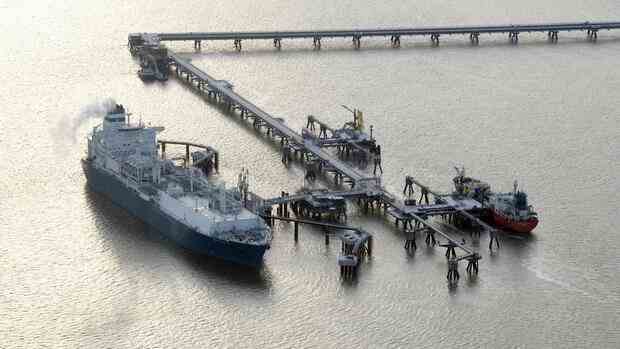It falls short of simply planning just enough import capacity to exactly replace the pipelines that previously brought gas from Russia to Germany. The energy supply situation in Europe is too complex for that.
(Photo: dpa)
The first German terminal for liquid natural gas – so-called liquefied natural gas (LNG) – has barely started operations when critics warn of overcapacity. Since the end of December, Germany has been able to import gas that arrives on its coasts by ship, making it less dependent on pipeline imports. The Federal Government intends to significantly expand the capacities for this in the coming months.
Climate protectors fear that Germany will build more LNG terminals than will be needed in the future. They point out that all the planned terminals together could import far more natural gas than previously came from Russia.
The debate about possible overcapacity at LNG terminals is important. After all, Germany would have to drastically reduce its gas consumption in the coming years in order to meet the climate targets. At the same time, the energy transition is becoming so expensive that the state should not afford to squander tax money on unused gas import capacities.
Nevertheless, it does not go far enough simply to plan just enough import capacity to replace the pipelines that previously brought gas from Russia to Germany. The energy supply situation in Europe is too complex for that.
Top jobs of the day
Find the best jobs now and
be notified by email.
On the one hand, Germany not only supplies itself but also neighboring countries with gas. At the same time, the state also imports gas from other European countries. Furthermore, it is not foreseeable when which countries in Europe will receive how much gas from Russia. Germany may have to compensate for further delivery cuts for other countries in the future.
The energy catastrophe has been averted, but the climate catastrophe is far from being
Unfortunately, one cannot simply assume that gas consumption in Germany will continue to fall every year from now on. In and of itself, that would be the best thing for the climate. But nuclear and coal-fired power plants are also to be shut down as soon as possible. It is possible that Germany will initially need more gas to replace coal and nuclear power.
>> Read here: What trap landlords face when changing gas tariffs for apartment buildings
Anyone who is already complaining that the federal government is miscalculating the LNG terminals should at least pause and acknowledge how much the current government has done in recent months to contain the energy crisis. After all, Germany launched the first LNG terminals in record time. These terminals are floating units that can be sent away again if necessary if someone else in the world wants to operate them.
>> Read here: From now on, Germany has to build six wind turbines every day
The German gas storage facilities were also full at the beginning of winter. In cooperation with neighboring countries, it was possible within a short period of time to actually become independent of Russian pipeline gas – albeit at high prices.
The Federal Government should not rest on its laurels – as exhausting as the past year has been. The energy catastrophe has been averted, but the climate catastrophe is far from being. Therefore, LNG capacities should indeed be planned with a sense of proportion and with a view to European cooperation. It’s not too late for that.
More: EU Commission approves billions in aid for Uniper – Datteln IV must be sold
